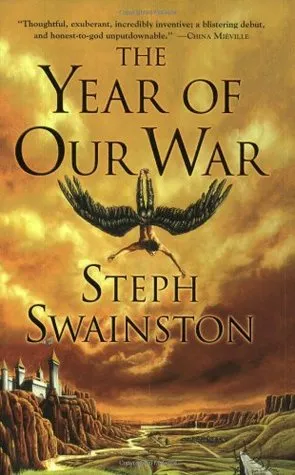China Miéville says: "Thoughtful, exuberant, incredible inventive; a blistering debut, and honest-to-god unputdownable."

This is the debut novel and indeed the debut writing work of author Steph Swainston, of which this is also the first work of her 'Castle' series, known also as the Fourlands books.
It has since been followed by No Present Like Time, The Modern World, the prequel Above the Snowline, and Fair Rebel. There are also four short stories collected together in Turning Point as well as Wrought Gothic, described as "a collection of mood pieces and background writings" and "not short stories but rather literary vignettes." All of them have been set in the world of the Fourlands.

Our central protagonist, Jant, is a hybrid of an Awian and a Rhydanne, meaning he can fly. It is for this reason that he is the Messenger in the Circle, a group of fifty individuals whom are the best at what they do and all of whom of which are sustained by the Emperor, an immortal god-like figure. The immortals are known also as the Eszai, the mortals as Zacsai - and the former are forbidden to some unknown extent to interfere with the latter.
It is set in the Fourlands, itself of which is divided - you guessed it! - into four lands: the Paperlands, Awia, the Plainslands, and Morenzia.
The Paperlands is dominated by the man-sized Insects, which seemingly come from another world. Both mortal and immortal alike are involved in a seemingly unending war against the Insects.
On top of this further is that other worlds exist. You see, our dear Jant is an addict to a substance which allows him to transcend the boundaries between worlds and arrive at the Shift, which is a weird place in the sense of Weird: jeopards - leopards with square spots - and fiber-toothed tigers! people made of worms! Oh me, oh my!
Beyond that, there are the other immortals, and they are beginning to come into conflict with each other: Lightning (the Archer, whose true name is Saker) and the woman he falls in love with, the conflict between Shearwater Mist and his wife, who has been (apparently) abused by him and wishes to take his place.
Beyond that the Insects have broke through the wall that had been keeping them at bay. The King of Awia is something of a coward who wishes to hide behind the walls of his castle. The previous King has been fighting the Insects in the Shift, driving them across a bridge back to the Fourlands.
Wow! That's a lot.
... you've got me. Perhaps you noticed, perhaps you didn't. But none of the above includes any real... opinion. I've danced around it a little, but the truth is, I found this book a little boring. None of the ideas are really developed to any great extent. We never meet more than a half-dozen of the immortals.
The Emperor, a god-like figure, when he meet him is rather... boring. Not very god-like at all. Certainly not nearly as fearsome as he is described.
Other secondary characters are really more sketches and do little to give you the impression of roundness. Shearwater Mist particularly has an unfortunate tendency to spout aphorisms and truisms in an abbreviated, two word form: "Curiosity. Cat." It's neat the first time around but becomes more and more and more irritating.
The Shift sounds far more strange and fantastic than it comes off. Instead it seems like a mildly more decorated and fantastic world.
The Insects are neat enemies: mindless, ruthless, incomprehensible. Interesting especially is their half-finished bridge, which in truth lets them cross between the Fourlands and the Shift. Interesting even more so is the idea within the novel that the Insects don't really "see" the gaps between worlds the way we do.
Jant's drug addiction, too, seems odd to me: he takes it, passes out, and returns - well, we never really get a straight answer, do we? Exhausted? Tired? But he's able to hold conversations almost immediately afterwards. I don't know if it's a good or a bad portrayal. It's not within my realm of experience (and I hope it never is) nor in my realm of knowledge.
The name, The Year of Our War, is misleading: it leads you to think of a lighter work, which this isn't. The novel wouldn't live up to the name anyway - it's not that comedic. It's held back, I think, by its choice of first-person perspective: almost everything is told from Jant's point-of-view. I never really got into Jant as protagonist.
In fact, some of my favorite moments were when it dipped into epistolary, either as letter or as news article.

Everything comes to an end far too quickly and I truthfully couldn't tell what the focus of the novel was supposed to be. It felt drifting and aimless: the conflicts between the various Eszai, Jant's addiction and jaunts to the Shift, Jant's reminiscing about when he was young, the Insect War...
At 384 pages, it felt very much to me as though there were too many ideas and not enough room to explore them nor even the correct venue to explore them - even though it was only 384 pages, there were many moments where the pacing felt slow. Not in the sense of deliberately slow, like Abraham or Abercrombie, but in the sense of poorly-paced slow. Slow slow.
Provided as the tag earlier was the cover blurb from China Miéville. I'll repeat it for you:
Thoughtful, exuberant, incredibly inventive; a blistering debut, and honest-to-god unputdownable.
Perhaps I would agree with that if Miéville had been the writer.